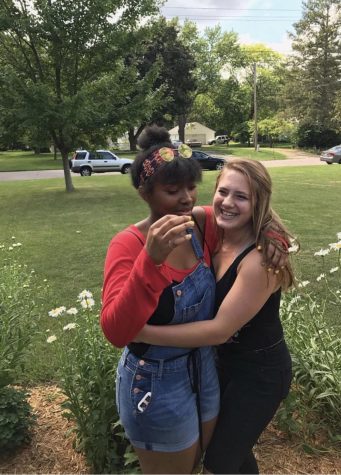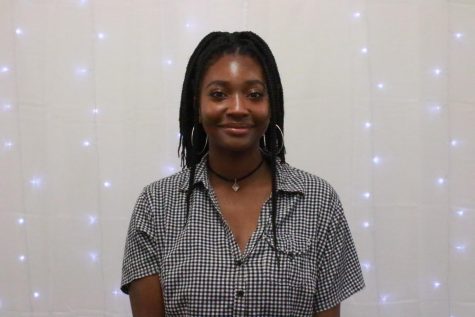More than my skin color
I can remember as far back as second grade, my very first experience with being called out as the “girl with weird hair.” I thought that maybe if I was weird with the hair I personally loved so much that maybe something needed to change, that I needed to change.

In sixth grade I made a decision to perm (or relax) my hair after countless begging and pleading from my mother and sisters not to. Perms involve the use of chemicals, the most common being alkali, to permanently “relax” or straighten naturally curly hair, and boy did I have curls.
After six months of being relaxed, I started noticing an unnatural amount of hair loss, and soon all of the hair on the back of my head fell off. The only remedy was to take a pair of clippers and buzz off the hair that remained. Nothing makes your stomach churn more than the sound of once a full head of hair being shaved down to nothing.
I had tried to change according to fit in more with the “status quo,” because having the hair I did wasn’t “normal,” and I paid dearly for it. From that moment on, I decided that if being “normal” resulted in shaving half of my head off, then forget that.
Sophomore year, I started to develop my own identity and invest in the things I truly enjoyed. I started listening to music other than rap and started changing my clothes to styles that were press prevalent among my peers. I faced backlash from friends, family, and even random people in the hallways. For a long time, I stopped dressing the way I did and listening to the music I wanted. I wondered, why couldn’t I like certain things that others did, and why didn’t they receive the same amount of negativity as I did for breaking social stereotypes?
The reality hit me hard one day when my brother headed out in a rush, saw me in one of my favorite outfits, stopped dead in his tracks, and said, “you’re black, not white. You can’t wear that stuff or else you’ll get made fun off.” It finally clicked, but in the worst way possible.
All the things I invested my time in all belonged to white culture. In the black community, liking “white” things is a big taboo. It means that you’re not happy being black and that you’re trying to be “white.” It means you don’t fit in. I felt like an outcast, too black for the white kids and too “white” for the black kids. I was genuinely stuck in an identity crisis that I didn’t know how to get out of.
For awhile, I thought maybe my brother was right and that I needed to stop being so different. I ditched the clothes I had picked for myself, the clothes I loved, and traded them for anything I saw on the “Instagram Baddie” pages because at the time that was “normal” and that’s how I wanted to be perceived.
I switched my soft-singing songs filled with feminine boys for the top 100 rap charts. I felt out of place; I was pretending to like things that didn’t do me any benefit except for the approval of my peers. Even worse, I was making compromises that didn’t make me happy for literally no social benefit: I still didn’t belong in any group since I still wasn’t “black enough.”
Junior year, after months of contemplating who I genuinely wanted to be, I left behind everyone’s judgements and strapped on the overalls and threw on those beat up red Chuck Taylors I hold near and dear to my heart. I didn’t want to be “white” or “black,” I wanted to be Anai. I wanted to be who I really was, regardless if my skin was black, white, green or purple. I realized that if I lived the life according to society’s standards, then I could never genuinely be happy. I immersed myself in the world of clothing and testing different fashion choices, and ultimately I felt the most comfortable in a thrift shop rummaging for hours through countless color coordinated racks.
I think that to this day it is important to be yourself, even as cliché as it sounds. To go against what society expects from you and create your own image of yourself, the one that makes you happy, is one of the best gifts you can give yourself. Like my favorite, Rupaul, says “When you become the image of your own imagination, it’s the most powerful thing you could ever do.”

It is your Editor N Chief with no beef Anai Freeman. While I enjoy writing informative features and covering stories that might be hard to talk about I...




Komalpreet Kaur • Mar 22, 2018 at 12:15 pm
This is the perfect example of what many kids go through in high school and you wrapped it all up in an article! This is beautiful, just like you:)
Issra Said • Mar 22, 2018 at 11:57 am
This is really touching since it applies to so many black people. The concept of acting “white” or black” is ridiculous and just reinforces stereotypes. I am happy that throughout this journey you found yourself and what you want.
Lily Antor • Mar 22, 2018 at 11:52 am
This is beautiful. Proud to even know you, Anai! <3
Mackenzie Brey • Mar 22, 2018 at 11:50 am
God I can’t even tell you how proud I am of this writing. It’s personal and empowering… Excellent work Anai
gabbie byers • Mar 22, 2018 at 11:46 am
Anai, this is so well written I love this.
keegan tenney • Mar 22, 2018 at 11:45 am
Anai, I love you beyond words. Don’t ever let no one bring u down <3 you are a beautiful black woman and you inspire me every day.
Lexi Doll • Mar 22, 2018 at 11:45 am
This is amazing and so inspirational. Keep doin you BB!
Meredith Ablao • Mar 22, 2018 at 11:41 am
I love this! I appreciate you sharing your real life experiences regarding your race and who you are as a human. You are valid and we appreciate your voice always!
Lexi Gavlas • Mar 21, 2018 at 7:32 pm
I love this article so much!! Keep doing you, girl.
Jalen Holland • Mar 14, 2018 at 11:54 am
This was an article so well written and so true! I’ve totally struggled with this, the “inside out Oreo” they referred to me as. I never had the courage to be myself in high school, it took me all the way until college to accept myself and doing things I truly enjoyed. Keep being true to yourself, Anai. Never change!